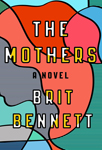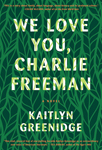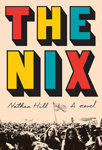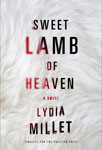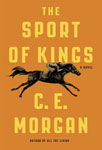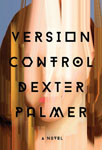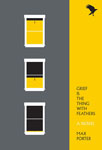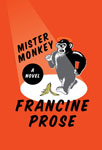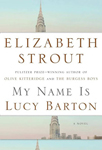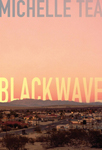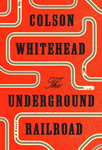by Charlie Jane Anders
Buy it at Powell’s »Rahawa Haile: By now you’ve probably read all you need to about Colson Whitehead’s The Underground Railroad. Cora, the novel’s protagonist, is a runaway slave who makes it from the plantation, to a seeming sanctuary, to an attic, to a wagon, to a fire, to the promise of peace. She is hunted by a renowned and violent slave catcher named Ridgeway. Here, the underground railroad is a literal railroad with literal trains capable of ferrying slaves to unknown destinations. Cora does not hesitate: “Away” is a risk worth taking. There is no better or worse for the black bodies waiting on these train platforms, only “not here.” As a reader, the feeling of anxiety is constant, buoying the novel with a compelling sense of urgency throughout. It is at its core the story of the hunted, of the watched.
Surveillance is likewise at the heart of Dexter Palmer’s Version Control, though few characters would acknowledge it as such. The story is set in a future near enough to center Google and Facebook in the lives of its characters, but far enough away to entertain time travel of a sort. Everything in this fictional world is monitored and personalized for the benefit of consumers. There are shops that size you up with cameras from the moment you walk in, analyzing your gait and mining your public photos in order to suggest the garments and sizes that might flatter you most (which we have). Child leashes have progressed to RFID implants (which we have). Naturally, this endless recording has led to the automation of everything from cars (hi) to restaurants, where people order food not from waiters but tablets on their tables (which, yes, OK, you know where I’m going with this).
Nowhere is this surveillance more insidious than in the business of matchmaking. Online dating takes center stage for Version Control’s Rebecca Wright, an alcoholic with a steady job at Lovability, upselling desperate people who are looking for companionship. At one point, technology and race intersect explicitly. Black women are lumped in with other romantic undesirables, leading the head of the dating site to create avatars of black men who are then played by employees like Rebecca hooked up to motion sensors. Rebecca’s marriage itself is crammed with all the grief, loss, and infidelity of a Richard Yates novel.
The result is a story set in the future, yes, but not so far ahead as to be truly futuristic. This proximity to the present relegates its rumination to the realm of the microscopic rather than the telescopic, looking deeper into what we are becoming instead of looking out into what we might become. In this context, what might have read as commentary about the human condition at times comes across as petty lecturing. The novel’s universe is ruled by corporate fascism. There is “would you kill painter Hitler?” philosophizing. Its craft is impeccable. The individual tone and pacing are exemplary. This is an exceptional book with exceptional shortcomings. Version Control feels like 400 pages of realist, suburban minutiae with 100 pages of genuinely engaging science fiction slapped on at the end. Some might argue the latter cannot exist without the former, and there are certainly some reveals for which this is true. Should your affinity for the genres hover around 4:1, however, you’re in for a treat.
I initially carried The Underground Railroad for a stretch in Vermont when I hiked the Appalachian Trail last year. I read it from end to end during a day off in Bennington, pausing only for pizza and a shower. The book was remarkable in its economy of stillness as well as its obvious despair. On Aug. 16, I clambered up a fire tower and read one of its pages to a seemingly endless forest. The structure swayed. The wind at that height was alarming, but so was the page. I found this second reading of The Underground Railroad equally engrossing despite being mired in a technological bubble/hell much closer to that of Version Control at present.
That said, there are fundamental similarities between the texts. Both books are critical of societies built upon the backs of the mined human. “In America the quirk was that people were things,” observes Ajarry, Cora’s grandmother in The Underground Railroad. In Whitehead’s novel, as in the real world, slavery reduces people to objects in order to justify its existence. In Version Control people elevate themselves to objects willingly for the sake of convenience. They are not more than the sum of their digital parts—their digital parts, scientific or otherwise, are the best of them.
There is a section from The Underground Railroad that crosses my mind often. “When Jeer could no longer work she looked after babies when their mothers were in the fields. Despite her torments, she was always tender to her girl, even if her big toothless smile fell like an ax the moment Lovey turned away.” In two sentences, Whitehead describes how slave life is the constant of keeping up of appearances (e.g., kind ones for your children, docile ones for your masters) even when its extremes threaten to tear you apart. It is this high-frequency oscillation that defines the slave experience: They brand themselves with a lack of self for the sake of survival. The Underground Railroad is compact storytelling at its best. And it will advance to the next round.
Match Commentary
By Lindsay Lynch & Halley Parry
Lindsay Lynch: Hello from Nashville! We’re commentating at Parnassus Books and it’s taking us a while because increasingly adorable animals keep coming into the store. No one here did any work for about two hours yesterday because there was a hamster in the back room. We are currently trying to commentate with a puppy on the shop floor. It’s really difficult, but this is the Tournament of Books and we are going to focus.
Halley Parry: If you know anything about Parnassus you know we are all about dogs and books, in that order.
Lindsay: Hooray for The Underground Railroad! I was excited for this matchup—I’ve been reading and hearing about The Underground Railroad for months (and with good reason, it’s a spectacular book). Version Control, on the other hand, I have heard virtually nothing about. To be perfectly honest, I initially set this up as a kind of David and Goliath scenario in my head where I would be completely swept away by Version Control. That did not happen.
Judge Haile was far more generous to Version Control than I was after finishing it. I couldn’t agree more with her statement that it’s “400 pages of realist, suburban minutiae with 100 pages of genuinely engaging science fiction slapped on at the end.” But alas, I cannot stand pages and pages of realist, suburban minutiae. It was rough. And I recognize that a large part of why I couldn’t stand Version Control is the fact that concise, minimalist fiction is having *a moment* right now. I probably only read a book that’s over 300 pages once or twice a year—it usually coincides with a snow day or me getting sick. I feel bad about this, but when your TBR pile is as tall as you are, your time gets compromised in weird ways.
Halley: I couldn’t help but cheer for The Underground Railroad. I have heard Lindsay express her love for this book for months to customers, it has been a store favorite since before it was published, and I knew it would be nearly impossible to sway her in another direction. I tried to keep an open mind when reading Version Control, and I genuinely couldn’t tell which way the judgment would go—how do you compare these two books? I can’t imagine anyone reading a passage from Version Control to a “seemingly endless forest.” It would be a clunky endeavor.
Lindsay: Even the trees would get exhausted!
Halley: I do agree with Judge Haile that Version Control is brilliantly crafted, both the world of the novel and its form. I feel inundated with novels that imagine a near future, and am weary of people looking for answers to our current world in these imaginations. This pairing highlights the power of fiction that speculates in either direction on a timeline.
Lindsay: Oh that’s a good point—I do like how Palmer takes present-day issues and shows how near-future technology would just exacerbate them. I feel a lot of other authors would use technology (self-driving cars, automated restaurants, etc.) to show how godly man could be. I appreciated Palmer pointing out that given access to these things we could all just become so much worse. We could reach our truest garbage state.
I liked the two-part structure, but still feel there was a lot of excess there. It’s especially unfair next to The Underground Railroad, which is, like Rahawa says, “compact storytelling at its best.” Colson Whitehead easily could have written a 500-page book, although I’m so happy he didn’t!
Halley: So much of the magic of The Underground Railroad lies in what he chooses to explain and what he lets the reader intuit from the text. There is a place in sci-fi (which I think is a category both books can fall under, right?) for the exhaustive minutiae that Rahawa mentioned, but it takes away the reader’s ability to sense and imagine rather than see. Not everything needs to be so intricately elaborated. I keep thinking about the chapter in which Whitehead reveals what happened to Cora’s mother Mabel. The transition from not-knowing to knowing was perfectly executed and left me wholly unsettled emotionally, a narrative punch that can only be delivered by the author dipping in and out of the story in a single, sparse moment.
Lindsay: It’s interesting to me that the structure of both books is largely dictated by their subject matter: Version Control has two mirrored parts and time travel, and the sections of The Underground Railroad are separated by the stops on the railroad itself. The beauty of Whitehead’s structure is that it allows him to pick the most vital moments of each stop. And I loved the windows into each character’s life at the end of each section—I agree it worked especially well with Mabel. There is so much build-up to her story, and Whitehead just gives us one perfectly chosen moment (which I will not reveal because spoilers).
Lately, I’ve watched so many sci-fi/fantasy writers become more and more inventive with structure. Version Control felt very cinematic to me: scene follows scene, with a few flashbacks thrown in. And then I think about authors like Ted Chiang and Ken Liu who are challenging how they structure their stories—there’s such a beautiful cohesion of complex subject matter (Space! Learning alien languages! Existential math problems!) and storytelling. (OK, so I’m an evangelist for “The Story of Your Life,” sue me.) It left me feeling disappointed with Version Control because I felt like so many compelling themes got lost in the noise of the book. Actually, that’s a great analogy for how Phillip feels about his time machine—excuse me, I mean causality violation device. All this complex work and thought goes into it, but all anyone can take away is “time machine.”
Halley: Maybe Palmer did work a bit of Phillip’s highly scientific, hyperactive brain into his style of narrative. Kelly Link also comes to mind as someone who can distill complex worlds unlike but very similar to our own without feeling the need to spell everything out. Giving the reader freedom allows the humanity of the characters to be the driving force of the narrative. Which is what I see as the unifying theme of the two books: dehumanization on both ends of the spectrum—those who are dehumanized and those who dehumanize themselves. Cora removes herself from surveillance. Yes, she is being hunted, but she is often the one doing the watching.
Lindsay: Yes, Kelly Link! It also makes me think of one of my favorite essays from Karen Russell in which she describes the Kansas-to-Oz ratio: the idea that in order for the reader to suspend disbelief in Oz, the writer needs to create a familiar set of parameters in Kansas that can carry over into Oz. Basically, we’ll accept that monkeys can fly if we see a person we identify with reacting to them accordingly. And, if done correctly, the ratio works so that the reader leaves Oz “with a renewed sense of wonder, and with an altered understanding of our own lives and bodies and boundaries.” I think this is really where Palmer trips up: Version Control is lacking in Oz. All those pages of realist, suburban minutiae feel disjointed from the careful world-building Palmer has done. I didn’t put down the book feeling like I had a new perspective on how technology could evolve in the future—it mostly just confirmed suspicions I already had. Whereas The Underground Railroad is such a good balance of a familiar, painful history with elements of the surreal. It gave me distance from my own preconceived notions of what America was like during slavery and reframed it in way that made me question how I approach this period of history.
Halley: Adult people—educated, rational adults—come into the store, and at some point in my conversation with them, I end up explaining that the underground railroad wasn’t an actual train, that Colson Whitehead made that part up. This has happened at least five times. That probably says more about our education system than the book, but it illustrates how effortlessly Whitehead was able to integrate this concept into his work, how the society he depicts (one that is devastatingly familiar to us in many ways) absorbs this new information. I agree with both you and Judge Haile that it wouldn’t be as brilliant of a novel without its compactness. A reader of The Underground Railroad is told the things that are important to the narrative, not information that simply garnishes a concept (regardless of how profound and technically brilliant the writing may be).
Lindsay: Predictions? My bet is Colson Whitehead will take the Rooster. Although my Zombie vote went to The Mothers because my love for Brit Bennett knows no bounds. I was also sad to see that Grief Is the Thing With Feathers is out of play—if I can sing the praises of short books once again, Max Porter did such a stunning job with 114 pages. Talk about Kansas-to-Oz ratio—Max Porter has it nailed down perfectly.
Halley: I am going to put all of my chips on the table/in the pot (I’m trying to make a poker metaphor here), going ALL in for The Vegetarian. Has everyone read that book yet? You should.
Kevin Guilfoile: Just popping in once again to thank Rahawa, Lindsay, and Halley, and to finish up the usual paperwork. In the final tally, Version Control does not have enough Zombie votes to keep it in the competition. With one contest to go before the Zombie Round, All the Birds in the Sky and, yes Halley, The Vegetarian are still our flesh-eating fictional foes.
Tomorrow, John and I will return as Homegoing meets The Nix with Aaron Bady making the call.





